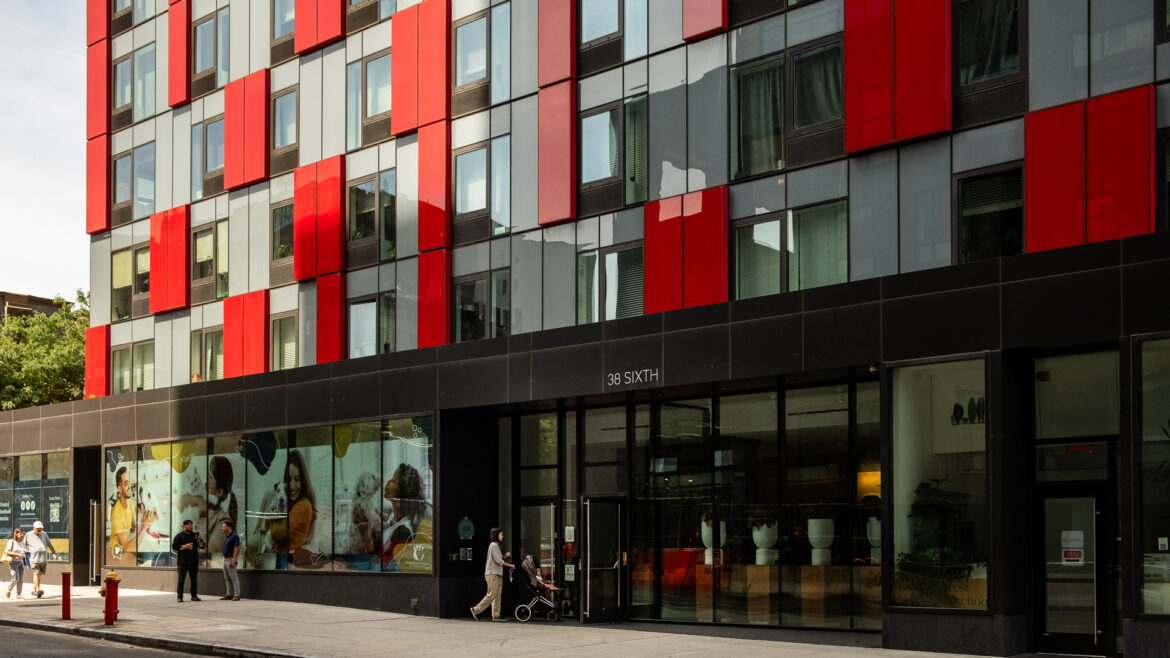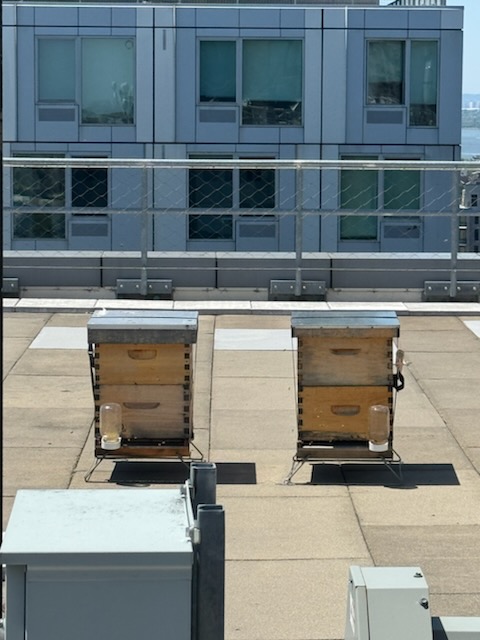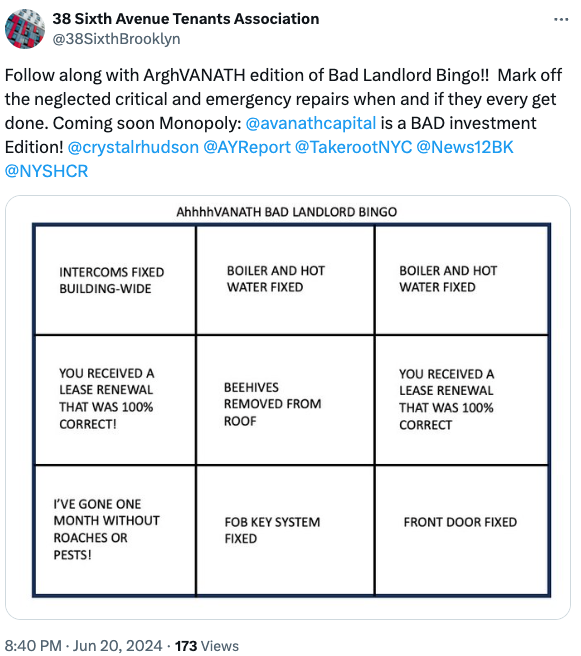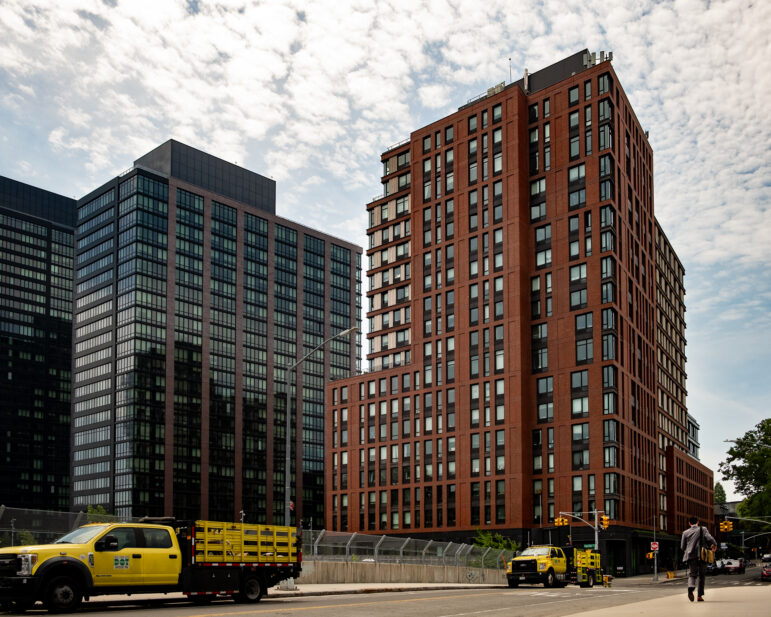Only after a local councilmember’s push did landlord Avanath meet with the tenant group at 38 Sixth Ave., but progress has come slowly, and tenants scorned a proposed partial rent abatement as insufficient.

Adi Talwar
38 Sixth Ave. opened in 2017, part of the Atlantic Yards (aka Pacific Park) project in Brooklyn, and touted by Mayor Bill de Blasio as delivering long-anticipated affordable housing.The website for 38 Sixth Ave. promises a “luxurious urban affordable apartment lifestyle,” touting “Brooklyn’s desirable Prospect Heights neighborhood,” spacious units with “stylish interiors,” concierge service, and a “caring on-site staff.” A virtual tour shows spiffy apartments and amenity spaces, befitting a building that opened in 2017, part of the Atlantic Yards (aka Pacific Park) project, and touted by Mayor Bill de Blasio as delivering long-anticipated affordable housing.
The reality, tenants say, has been dismaying: “broken intercoms & windows, cockroaches/bee swarms, no hot water, filthy building, broken laundry machines, lost/stolen mail, broken elevators,” as resident Sara Sarakanti posted May 27 on Twitter/X.
Tenants say the 303-unit building, built by Greenland Forest City Partners and previously managed by Pinnacle, has long had problems, but they worsened after May 2022, when the Irvine, CA-based Avanath Capital Management, an expanding investment firm that specializes in affordable and workforce housing, bought 38 Sixth and the similar 535 Carlton Ave., two “100 percent affordable” towers, albeit skewed to middle-income tenants.
That’s led to anxiety, frustration, and outrage, with residents lobbying for months to get the boiler and a non-locking front door fixed, as well as other repairs, such as faulty intercoms—affecting perhaps 30 percent of units—that stymie communication.
Only recently has there been progress—notably, fitful patchwork on the boiler system and shifting deadlines for a front-door fix—which Hugh Chapin, who spearheaded the revival of the 38 Sixth Avenue Tenants’ Association (TA), assessed as “slow, reluctant, and not collaborative.”
At an emergency meeting July 9, Avanath Regional Manager Adam Butler proposed a partial rent abatement for four recent days without hot water. That prompted scornful responses that the rebate should cover a far longer period, given regular hot water outages, and for the full range of issues.
Fitful progress
While Avanath already held 458 units across 26 buildings in New York City, primarily in Brooklyn (most in a joint venture with Oak Tree Management), 38 Sixth and 535 Carlton avenues “are the first Brooklyn-based properties to be managed by Avanath,” according to a 2022 press release from the company.
“We will be completing energy-saving upgrades… investing in ‘green’ assets for the buildings, and offering social impact programming for residents,” stated John O’Connor, Avanath’s acquisitions director, invoking the ESG (environmental, social and governance) commitment that has drawn institutional investors to the firm’s private equity funds.
Instead, Avanath’s had trouble maintaining basic services, which, residents say, means they’ve had to scramble to take showers or boil water for dishes, and worry about their kids loose in a less-than-secure building, where non-tenants, including local workers and unhoused people, have made pit stops inside the lobby. For months, Avanath has had multiple open violations regarding the front door, hot water, and more, found by the New York City Department of Housing Preservation and Development (HPD).
On May 29, the TA, in a letter sent on their behalf by Councilmember Crystal Hudson with legal nonprofit TakeRoot Justice, requested immediate action on building-wide conditions (including lack of hot water, the faulty front door, and even beehives on the roof producing swarms), individual apartment issues, and what they saw as questionable practices regarding leases and billing.
Only after that letter did Avanath agree to a meeting, held June 13. Avanath reps, sounding conciliatory, agreed to address several of their concerns.
Two beehives on the 23-story building’s roof—which drew complaints from upper-floor residents, unnerved after a swarm flew into their open windows, and even blocked the building’s entrance—were soon gone. But a temporary patch on the boiler didn’t work.

Shared with City Limits
Beehives previously placed on the roof of 38 Sixth Ave. drew complaints by tenants about swarms. They’ve since been removed.“Delays outside of our control,” Butler wrote June 20 in response to a letter from Hudson’s office. A new hot water tank was finally installed June 30, but tenants still suffered four days without hot water, lasting until the morning of July 9. Avanath promised to perform new diagnostic tests on July 12 to better understand boiler flaws and eliminate “shutdowns whenever possible.” Some hot water complaints have continued.
If the replacement tank works, Chapin observed earlier, it would be “a big step forward from the status quo of the previous year of ‘we will just restart the boiler every two hours.’”
Regarding the front door, Butler initially demurred. “While waiting for a permanent solution we will adjust our services to include an additional person in the lobby after business hours as a safety precaution,” he wrote to tenants June 20. “The door will not be replaced at this time.”
On June 26, a new staffer started checking people in, but “it is yet to be seen whether the new person… will appropriately respond to unwanted entries” into the building, said Chapin. On July 3, the landlord announced a front door repair to start around Aug. 8; on July 19, it moved that deadline up, promising to begin that work this Thursday.
Before then, in part of a brief statement sent June 25 responding to specific questions from City Limits, Avanath didn’t offer repair timelines but said, “[O]ur team is committed to effective, long-term solutions that can take time to implement as they involve various vendors. Where and when appropriate, suitable temporary fixes are in place to alleviate issues, not to serve as an alternative.”
At the June 13 meeting, tenants say, Avanath’s interim community manager Ty Lattimore blamed some problems on her predecessor, who’d recently left her job, though tenants said that staffer had tried to work with them. Lattimore also acknowledged that the building’s 2022 transition from Pinnacle was one of Avanath’s “roughest” takeovers, because of incomplete documentation on leases.
Since Avanath took over the building, HPD has lodged 15 C (immediately hazardous) and 17 B (hazardous) open violations, not a large number compared to, say, buildings on the Public Advocate’s “worst landlord” watchlist, but still a sign—accentuated by the 400-plus complaints filed by tenants since April—that basic services have been lacking.
Asked for comment, a spokesperson stated June 27, “Safety is our number one priority—HPD inspectors issued numerous violations leading to the restoration of hot water, because all New Yorkers deserve to live with dignity.” A pending violation for the lack of a self-closing front door can still be corrected.
TakeRoot Justice is helping residents file for rent reductions with New York State Homes and Community Renewal based on a decrease in services.
A growing business, and a troubled building
Avanath, which has acquired 108 properties in 14 states since its founding in 2007, is clearly in growth mode, focusing on both coasts plus select major urban areas, aiming to align “profits and purpose.” In 2022, it entered Affordable Housing Finance magazine’s list of the nation’s Top 50 affordable housing owners, ranked at 31. In 2023, it rose to the 29th slot.
As of last October, Avanath had $3.7 billion of assets under its management, with more than 15,000 apartments. Two years ago, an executive said Avanath aimed to deploy at least $1 billion in capital each year. While aiming for “strong risk-adjusted returns” in the low-to-mid teens, it pursues cost-effective operations. A video on its YouTube channel advises “Don’t Over-Improve,” which notes that too much investment might generate unaffordable rents.
Avanath says its investment strategy is to target “affordable and value priced apartment communities that appeal to residents making $30,000 to $80,000 per year.” In March, CEO Daryl Carter said that their average tenant pays $1,500/month.
That may be an awkward fit in Brooklyn, where the two Atlantic Yards/Pacific Park buildings Avanath manages—the only two buildings in the project where 100 percent of apartments are income-restricted—include 65 percent middle-income units, with households earning, in the main, well over $80,000 per year and paying rents far above that $1,500 average.
While Avanath executive John Williams said in a 2019 interview that the firm buys “these assets at half of development costs,” the purchase of 38 Sixth and 535 Carlton came at a much lower discount, about 15 percent.
With 38 Sixth, Avanath acquired a troubled building, whether they recognized it or not. In July 2020, the previous version of the Tenants’ Association sent a letter, signed by 96 households, to the building’s owner and management company, asking for the latter to be replaced unless there was a clear strategy to address “unmitigated quality of life issues.”
They noted 38 Sixth had its third building manager in two years, and the lack of a live-in super—the job was and remains shared with 535 Carlton, one long block away—hampered building upkeep and response to service outages.
This January, the lack of progress prompted Chapin and others to reconstitute the TA, hoping they could collaborate with Avanath to resolve lease issues and hasten critical repairs. After the building’s previous community manager told the TA she’d been told there was no budget to fix the front door, tenants agreed to help lobby her superiors. But Avanath ignored a letter from Councilmember Hudson seeking a front-door fix, and stopped communicating with the TA until Hudson later intervened, according to tenants.
After a Memorial Day weekend hot water outage, the frustrated TA launched a Twitter/X campaign, criticizing Avanath for refusing to fix the boiler and the door. It has highlighted other issues, such as a burst water pipe leaking into an apartment and a guard asleep at the desk.

Twitter/X Screengrab
A social media post from the 38 Sixth Ave. Tenant Association, criticizing Avanath for issues at the building.Sarakanti, whose living-room window had been faulty for at least four years, separately posted about a broken window seal not repaired as scheduled. “Anytime there’s a storm,” she told City Limits, “the elements come into my living room.” The rubber gasket was eventually patched, she said, but only after she was forced to push the window closed for 15 to 20 minutes during a windy storm.
Tenants face other issues. Luis Leal, who moved into 38 Sixth in November 2017 after winning a city housing lottery for an apartment reserved for people with disabilities, was optimistic at first: “brand new building, nice apartment, nice location.” Over time, though, he’s gotten steadily frustrated, sending hundreds of emails to management, with rare responses.
The hot water outages forced him to boil water to stay clean, using buckets reminiscent of his childhood in Cuba. Worse, while signs proclaim “No Smoking” in the building, Leal said Avanath, unlike predecessor Pinnacle, has not enforced the rule, so smoke from the floor above him aggravates his asthma and has sent him to the hospital.
“My inhaler,” he said, “I usually use maybe once or twice a day. Now I have to be using it almost five or six times a day.”
Smoke seeps through a bathroom vent and other vectors. (On this reporter’s visit, Leal’s unit still smelled faintly of cigarette smoke.) He’s applied silicone to seal the outside of an electrical box and taped a shower curtain over a porous part of his closet. Sometimes marijuana smoke enters as well, he said.
On June 14, Avanath circulated an email, reminding tenants—for the first time in their memory—that 38 Sixth is a smoke-free building and that smoking is a lease violation, enforceable in court. Three weeks later, though, Leal said that continued smoke penetration had put him in the hospital again, and his health care team asked that he be moved to a different unit.
Of the three Avanath-managed buildings in Brooklyn, 7 DeKalb Ave. has few complaints, while 535 Carlton has nearly 100 complaints filed with HPD in the past two years, but none since hot water outages in May. Previous issues included a broken entrance door.

Adi Talwar
The terracotta-colored 535 Carlton Ave., at right, is the other building owned and managed by Avanath at Atlantic Yards/Pacific Park.“They address issues most of the time, though usually only after multiple complaints,” a member of the 535 Carlton Tenants Association told City Limits, noting that faulty air conditioning in the lobby means desk staff prop the doors open for fresh air, limiting security, and that Avanath is slowly replacing the key fob entry system.
Avanath’s smaller buildings, managed by joint venture partner Oak Tree, mostly lack significant HPD complaints.
Lease issues, other complaints
Early in the pandemic, then-manager Pinnacle did not renew tenant leases at 38 Sixth, and Avanath maintained that posture in 2022 and 2023. When Avanath began offering leases this year, some residents saw mistakes, such as higher percentages than those set by the Rent Guidelines Board, which votes annually on rent adjustments for tenants in regulated housing.
When notified of the errors, an Avanath rep at the June 13 meeting told tenants—according to a report-back from the TA—that mistakes resulted from confusion when the building changed hands. Those detecting problems could get them fixed, she said, prompting tenants to say that should be the landlord’s responsibility.
The TA’s May 29 letter said tenants have been charged “acquisition balances” that “apparently are meant to represent alleged arrears that accrued before the change in ownership,” but which fail to credit payments made either by the tenants or by the Emergency Rental Assistance Program—and they’ve been denied a monthly breakdown of these balances.
At the June 13 meeting, Avanath said it would waive such balances for those with an unblemished recent rent history, but not if a tenant had missed payments. That, tenants said, could still penalize residents for unreliably documented debts.
As to complaints about malfunctioning laundry equipment , Avanath had said tenants should address the contractor, Hercules, but tenants say Hercules has no obligation to them. Avanath did agree to regularly refund losses from laundry equipment. In response to concerns about cleanliness, it has posted a new cleaning schedule.
The TA letter also contained a list of individual apartment complaints, from unstable and loose bathroom mirrors—some have previously crashed into shards—to mold, a broken toilet, and broken key fobs. On July 3, Avanath told tenants that a vendor had identified faulty wiring in the intercoms, and management would contact the affected tenants. While Sarakanti told City Limits July 1 that the only issue that had been dealt with—on her long list of concerns sent to management—was her intercom, she later said it still needs work.
At the meeting last month, according to the TA report, interim staffer Lattimore said that Avanath’s policy is to go door-to-door, twice a year, to ask tenants if they need repairs, but acknowledged it had not yet been done at 38 Sixth.
It’s unclear when that will start; Avanath last month advertised for a new community manager who “oversees the community in an efficient and profitable manner through fostering an environment of satisfaction and well-being.” That manager started July 22. The building’s leasing administrator left her job recently.
“Sustaining consistent open-door communication with our residents is a top priority,” Avanath said in its general response to City Limits. “While we cannot publicly discuss details regarding specific, individual matters out of respect for our residents, we continue to encourage our residents to come to us with their questions or concerns.”
The landlord seems to recognize it must do more. On July 15, a new “interim resident services coordinator” for 38 Sixth, 535 Carlton, and 7 DeKalb started, and launched a weekly newsletter, which announced a free wine tasting event next month at 7 DeKalb. A July 19 management update on the emergency meeting promised inspection of air conditioning in hallways and elevators, a three-week wait time for boiler parts, and a survey regarding intercom service.
Despite Avanath’s efforts, the response to the proposed rent abatement shows tenants remain to be convinced. As Chapin observed earlier this month regarding promised fixes, “If the past is a precedent, they will miss these deadlines.”
To reach the editor, contact Jeanmarie@citylimits.org.
Want to republish this story? Find City Limits’ reprint policy here.









3 thoughts on “Despite New Owner’s Promised Upgrades, ‘100% Affordable’ Atlantic Yards Building Endures Hot Water Outages, Broken Door, Even Bees”
Slumlords
In December 2024, the serious health and safety issues have still not been fixed.
Even after a settlement where Avanath agreed to 4 violations including the roach infestation, the front door, broken intercoms and a faulty front door, the front door isn’t fixed (still unlocked too), the roach infestation has not gotten better, and now that the hot water was taken off the lawsuit the hot water has been out like before for many days out of 2025. There are many 311 reports for hot water and roaches. It seems as though Avanath was directing its employees to “reset” the boiler every night and now has stopped that routine. Another words, the boiler was never “fixed” and very likely needs to be replaced. At the every least it appears that only under the pressure of a lawsuit will Avanath make any efforts to repair or remedy issues in our building. That at the end of the day their bottom line trumps NYC housing laws. Avanath would rather spend money on lawsuits than sustainably repair our building or have the staff to properly maintain it.